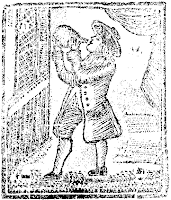John Carnes: “in the grocery-way”
 As I described yesterday, in 1764 the Rev. John Carnes finished his second unhappy stretch in a pulpit and came home to Boston. He gave a few more sermons, but apparently gave up the idea of trying to find another minister’s post. Instead, Carnes decided to go into business.
As I described yesterday, in 1764 the Rev. John Carnes finished his second unhappy stretch in a pulpit and came home to Boston. He gave a few more sermons, but apparently gave up the idea of trying to find another minister’s post. Instead, Carnes decided to go into business.
Carnes opened a shop on Orange Street (now Washington Street) in the South End of Boston. He applied for a license to sell liquor, which the Boston selectmen didn’t grant until 1766. I haven’t found any advertisements from him in the newspapers announcing what he had for sale, but he did advertise after a robbery at his store in 1769. The notice indicates that Carnes sold cloth, shoes and stockings, penknives, notions, and other goods.
Carnes stayed out of Boston’s pre-Revolutionary politics, except for one odd moment. On 25 Jan 1770 Christopher Prince published an open letter in the Boston News-Letter asking Edes and Gill, the printers of the rival Boston Gazette:
in what Manner I am to obtain Satisfaction of two Person in this Town, who have attempted without the least Foundation to blacken my Character, in an artful Piece in your Paper of last Monday.The horrible act that the Gazette writer had accused Prince of doing was recommending that a man from Leicester buy from Nathaniel Rogers, a nephew of Lt. Gov. Thomas Hutchinson who had at first refused to sign the non-importation agreement, then agreed to do so, then backed out again. Prince insisted that at the time he hadn’t known about that last part.
One of which Persons I strongly suspect is a quondam Parson, and twice separated from this People, for Reasons best known to himself, and from a Preacher of the Gospel now follows the laudable Calling of retailing Rum to the Soldiers at the South Part of the Town.
In the 29 January Gazette Carnes responded with a long letter denying that he had written the earlier essay, and then accusing Prince of doing exactly what it said. As to the sneers against himself, Carnes wrote:
In respect to my being in the laudable Business of Retailing, it is the Fruit of Necessity, and very usual with all persons who are in the grocery-way in the south part of the town where I live.—But how low? how false the suggestion of my selling Rum to the soldiers? Tis true when I first sold liquors, I sold them indiscriminately to all customers; but as soon as I was convinced of the impropriety of supplying the soldiers with that article, I refused to let them have any; and Mr. Prince being a neighbor, must I think have known, that for near eight months past, I have declined selling to them.Carnes went on to accuse Prince of behaving “like a true Italian, hugging a man in his arms, while that moment he determines to stab him.” (Carnes had probably never met an Italian in his life.) And he concluded about his neighbor’s remarks:
I need no public vindication, other than that has been given me by such their superiors, and consequently am compell’d to despise the little attempt made to injure my character, by a dirty Fellow, remarkable for his want of Education, and may I not add, remarkable for Profanity and Impudence?Things must have been pleasant along Orange Street that winter.
COMING UP: John Carnes in the siege of Boston.

No comments:
Post a Comment